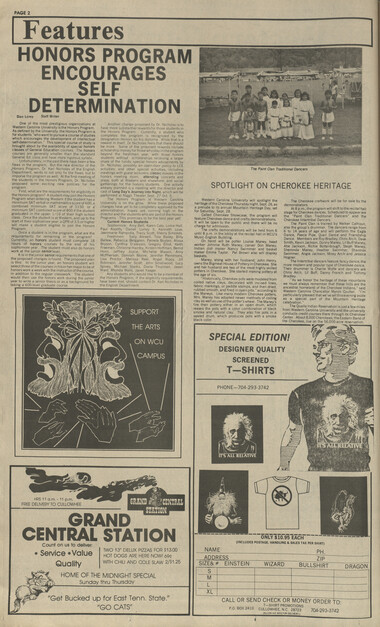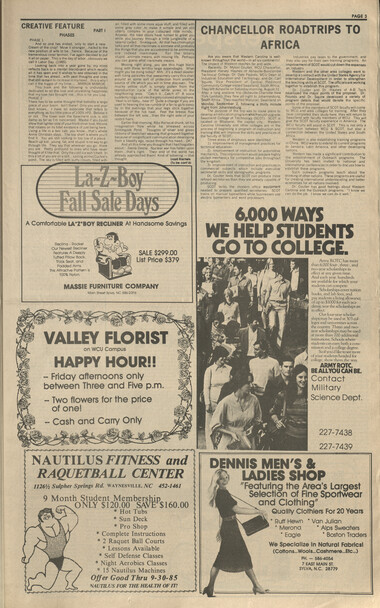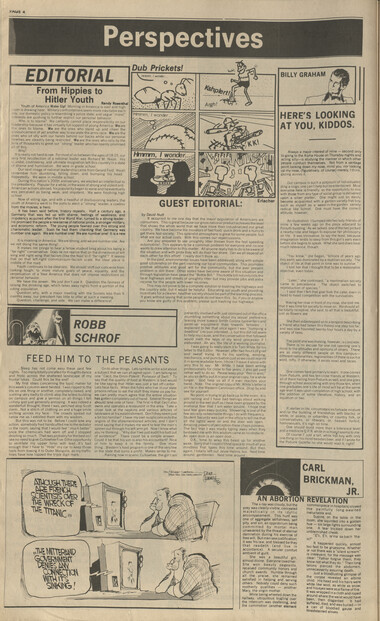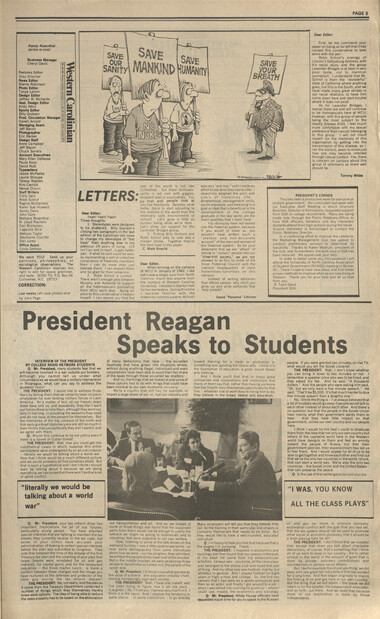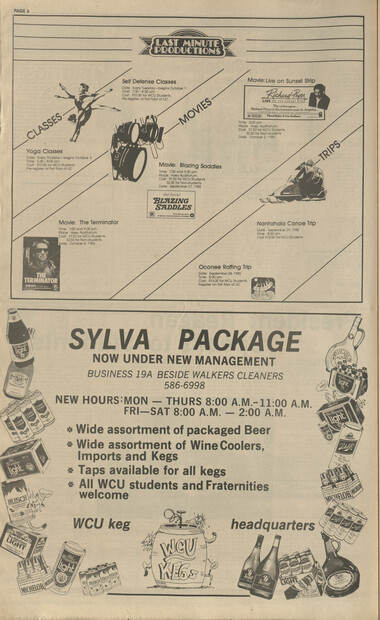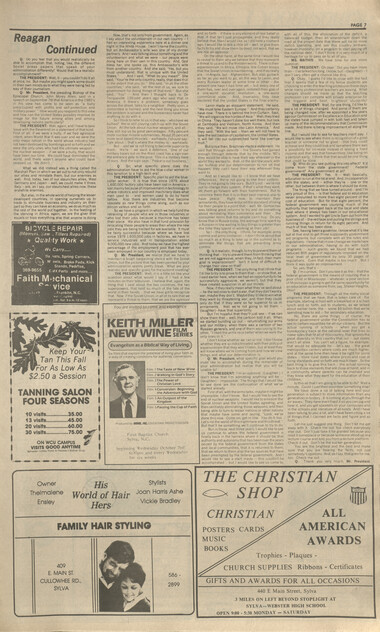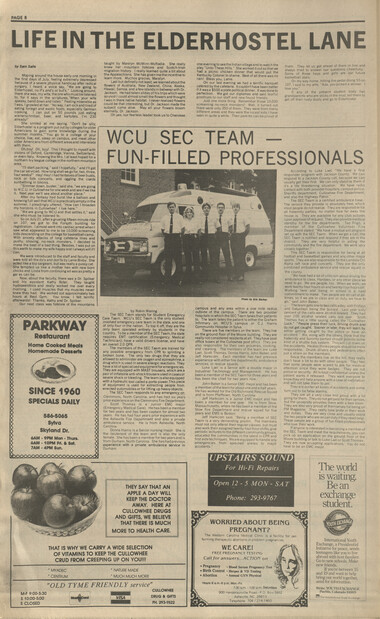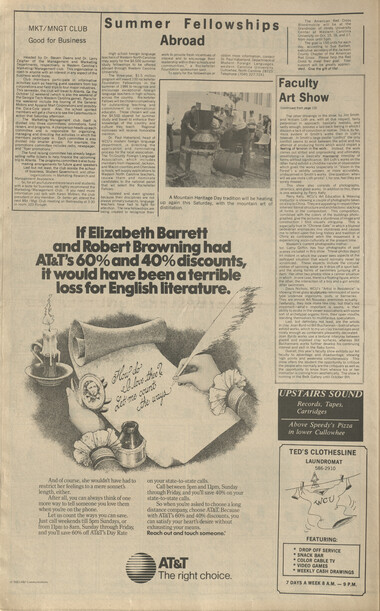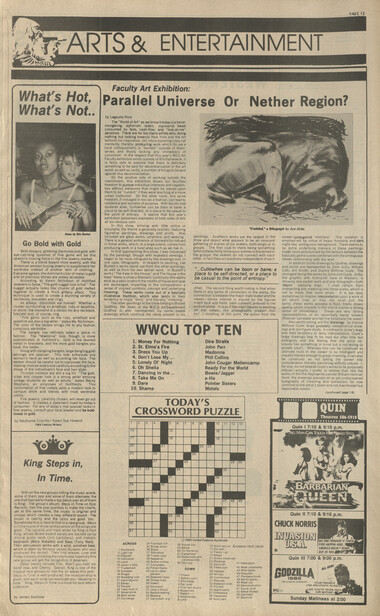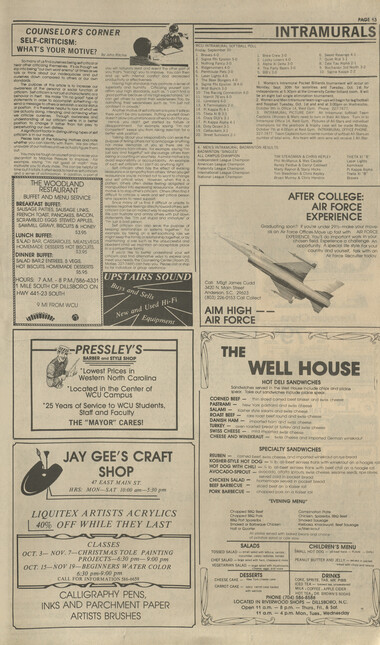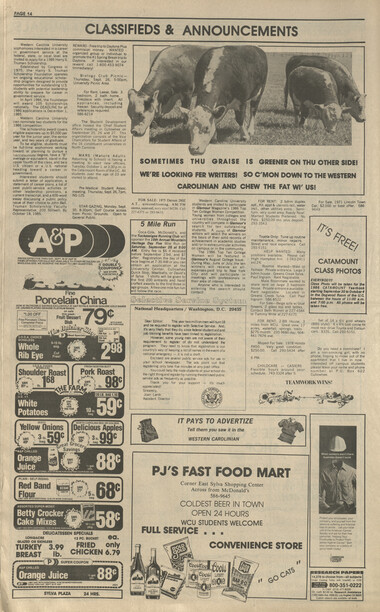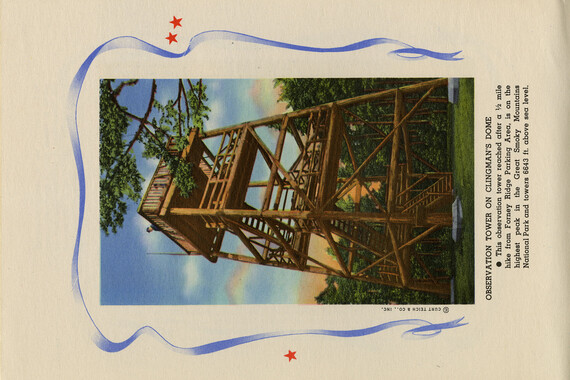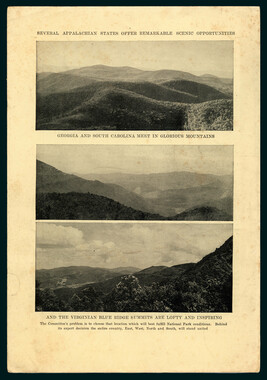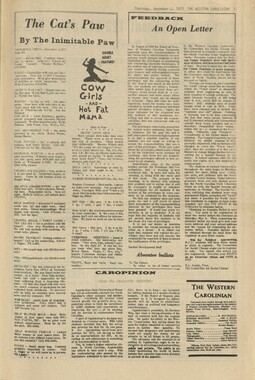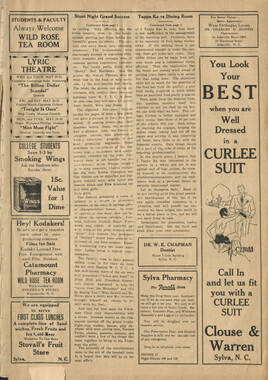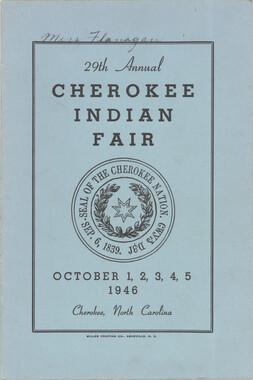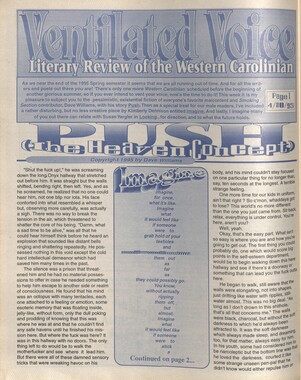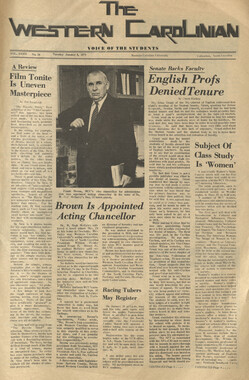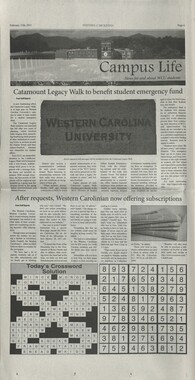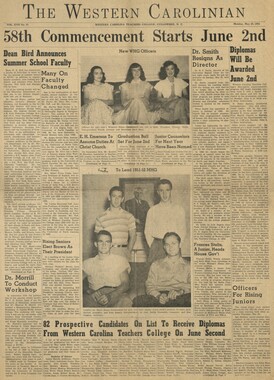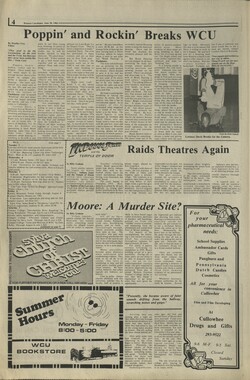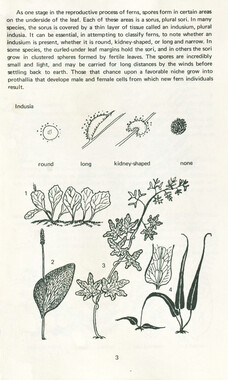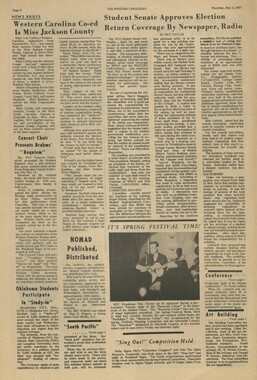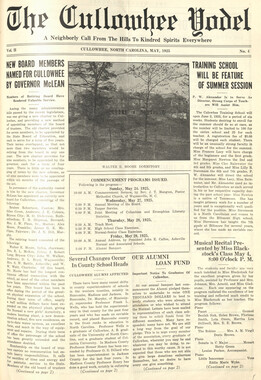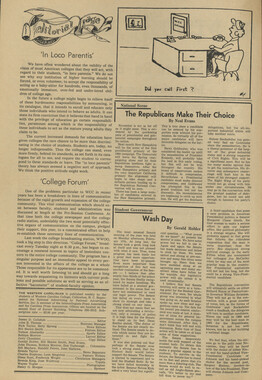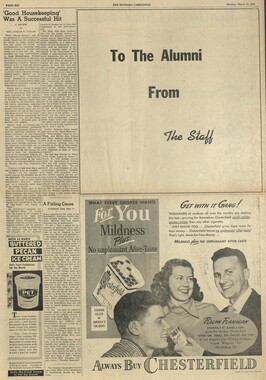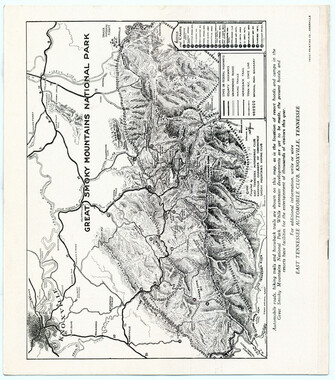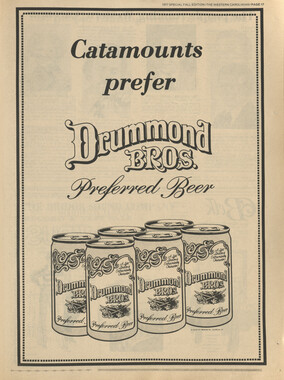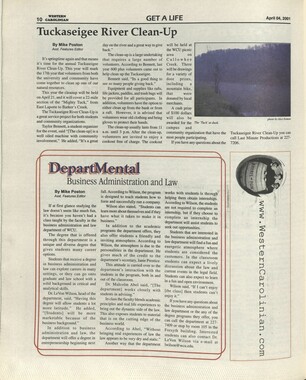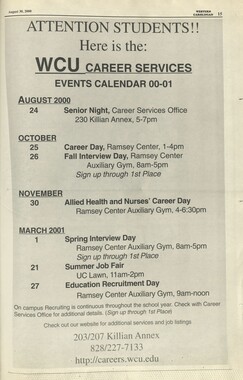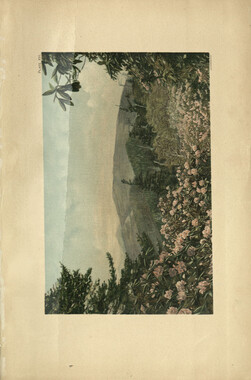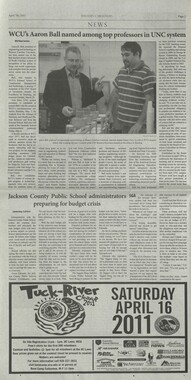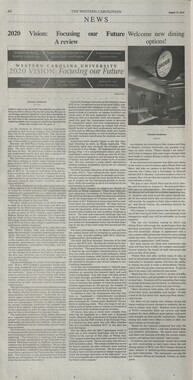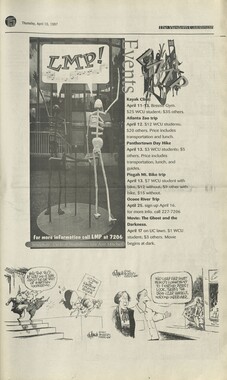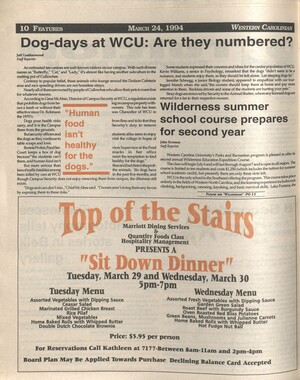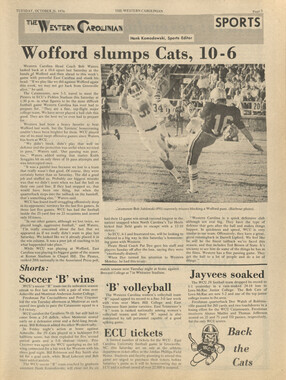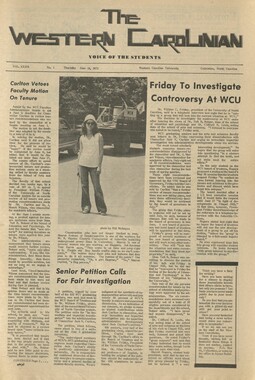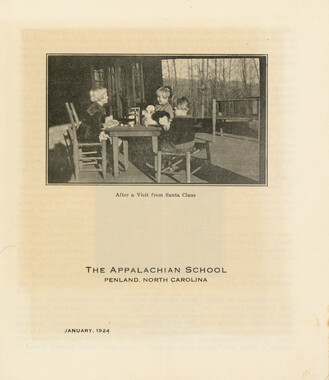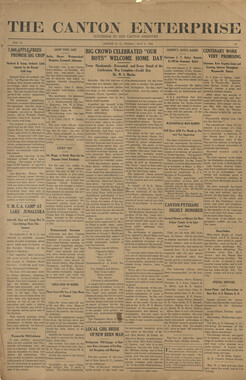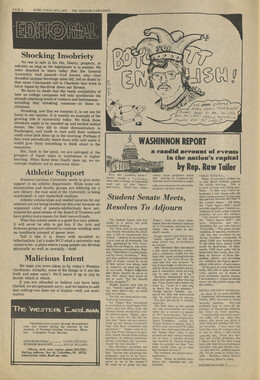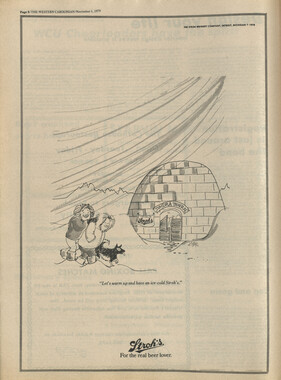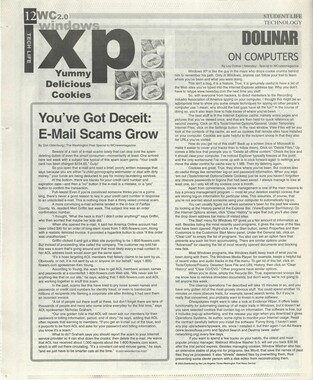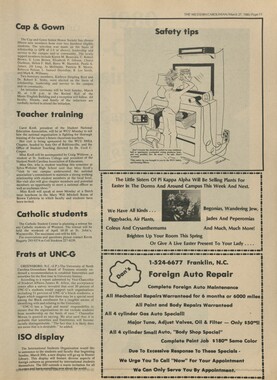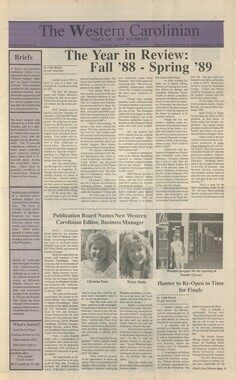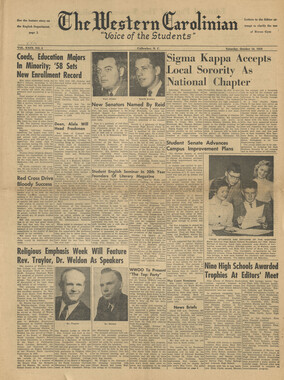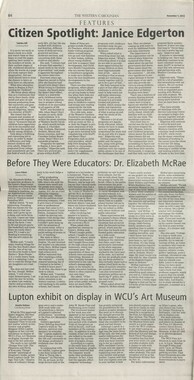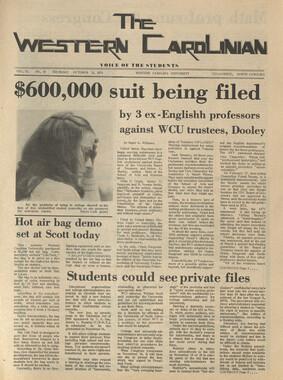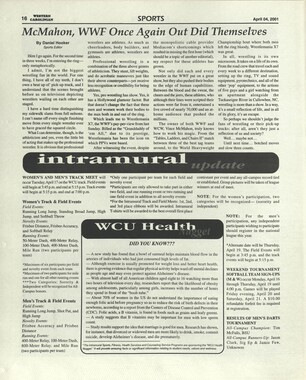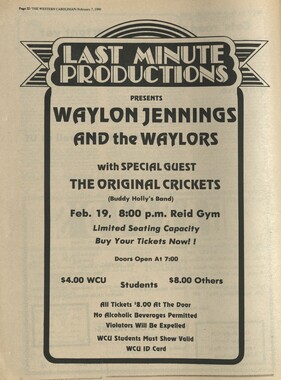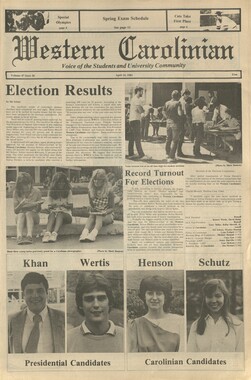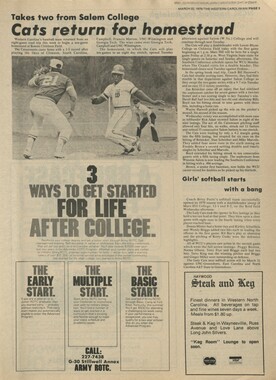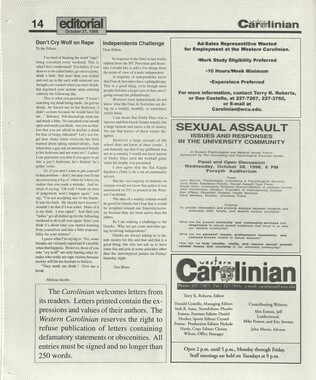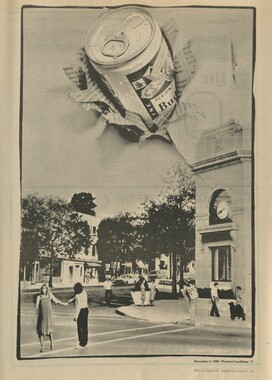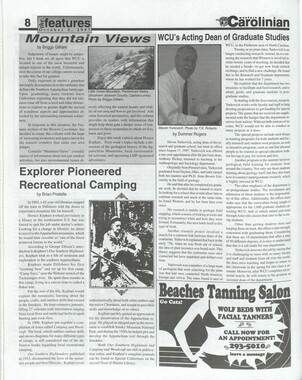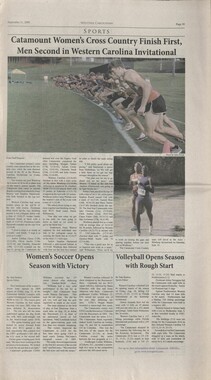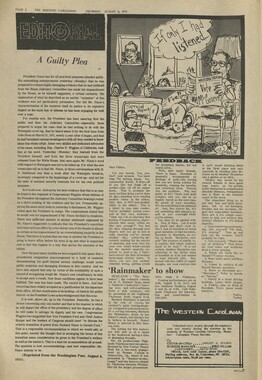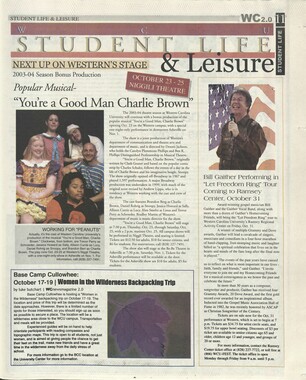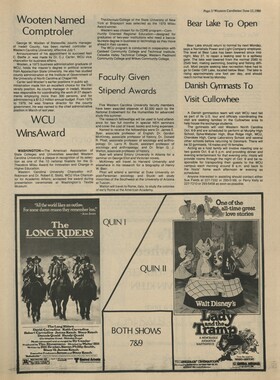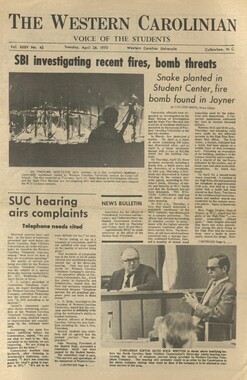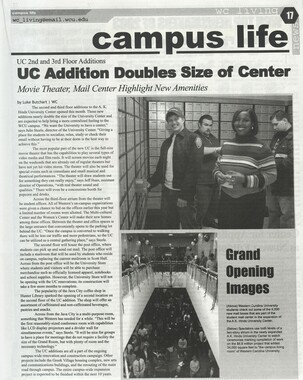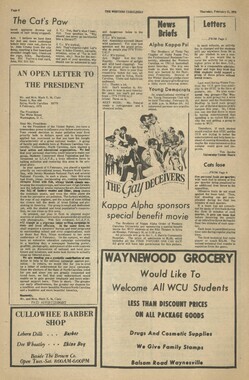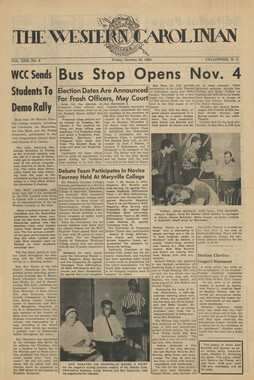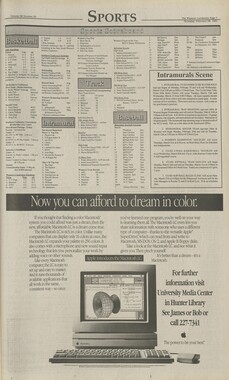Western Carolina University (20)
View all
- Canton Champion Fibre Company (2308)
- Cherokee Traditions (291)
- Civil War in Southern Appalachia (165)
- Craft Revival (1942)
- Great Smoky Mountains - A Park for America (2946)
- Highlights from Western Carolina University (430)
- Horace Kephart (941)
- Journeys Through Jackson (159)
- LGBTQIA+ Archive of Jackson County (85)
- Oral Histories of Western North Carolina (314)
- Picturing Appalachia (6873)
- Stories of Mountain Folk (413)
- Travel Western North Carolina (160)
- Western Carolina University Fine Art Museum Vitreograph Collection (129)
- Western Carolina University Herbarium (92)
- Western Carolina University: Making Memories (738)
- Western Carolina University Publications (2488)
- Western Carolina University Restricted Electronic Theses and Dissertations (146)
- Western North Carolina Regional Maps (71)
- World War II in Southern Appalachia (131)
University of North Carolina Asheville (6)
View all
- Western Carolina College (199)
- Western Carolina Teachers College (239)
- Western Carolina University (1973)
- Allanstand Cottage Industries (0)
- Appalachian National Park Association (0)
- Bennett, Kelly, 1890-1974 (0)
- Berry, Walter (0)
- Brasstown Carvers (0)
- Cain, Doreyl Ammons (0)
- Carver, George Washington, 1864?-1943 (0)
- Cathey, Joseph, 1803-1874 (0)
- Champion Fibre Company (0)
- Champion Paper and Fibre Company (0)
- Cherokee Indian Fair Association (0)
- Cherokee Language Program (0)
- Crittenden, Lorraine (0)
- Crowe, Amanda (0)
- Edmonston, Thomas Benton, 1842-1907 (0)
- Ensley, A. L. (Abraham Lincoln), 1865-1948 (0)
- Fromer, Irving Rhodes, 1913-1994 (0)
- George Butz (BFS 1907) (0)
- Goodrich, Frances Louisa (0)
- Grant, George Alexander, 1891-1964 (0)
- Heard, Marian Gladys (0)
- Kephart, Calvin, 1883-1969 (0)
- Kephart, Horace, 1862-1931 (0)
- Kephart, Laura, 1862-1954 (0)
- Laney, Gideon Thomas, 1889-1976 (0)
- Masa, George, 1881-1933 (0)
- McElhinney, William Julian, 1896-1953 (0)
- Niggli, Josephina, 1910-1983 (0)
- North Carolina Park Commission (0)
- Osborne, Kezia Stradley (0)
- Owens, Samuel Robert, 1918-1995 (0)
- Penland Weavers and Potters (0)
- Rhodes, Judy (0)
- Roberts, Vivienne (0)
- Roth, Albert, 1890-1974 (0)
- Schenck, Carl Alwin, 1868-1955 (0)
- Sherrill's Photography Studio (0)
- Smith, Edward Clark (0)
- Southern Highland Handicraft Guild (0)
- Southern Highlanders, Inc. (0)
- Stalcup, Jesse Bryson (0)
- Stearns, I. K. (0)
- Thompson, James Edward, 1880-1976 (0)
- United States. Indian Arts and Crafts Board (0)
- USFS (0)
- Vance, Zebulon Baird, 1830-1894 (0)
- Weaver, Zebulon, 1872-1948 (0)
- Western Carolina University. Mountain Heritage Center (0)
- Whitman, Walt, 1819-1892 (0)
- Wilburn, Hiram Coleman, 1880-1967 (0)
- Williams, Isadora (0)
- 1920s (57)
- 1930s (69)
- 1940s (114)
- 1950s (66)
- 1960s (314)
- 1970s (599)
- 1980s (406)
- 1990s (379)
- 2000s (282)
- 2010s (175)
- 1600s (0)
- 1700s (0)
- 1800s (0)
- 1810s (0)
- 1820s (0)
- 1830s (0)
- 1840s (0)
- 1850s (0)
- 1860s (0)
- 1870s (0)
- 1880s (0)
- 1890s (0)
- 1900s (0)
- 1910s (0)
- 2020s (0)
- Jackson County (N.C.) (2463)
- Appalachian Region, Southern (0)
- Asheville (N.C.) (0)
- Avery County (N.C.) (0)
- Blount County (Tenn.) (0)
- Buncombe County (N.C.) (0)
- Cherokee County (N.C.) (0)
- Clay County (N.C.) (0)
- Graham County (N.C.) (0)
- Great Smoky Mountains National Park (N.C. and Tenn.) (0)
- Haywood County (N.C.) (0)
- Henderson County (N.C.) (0)
- Knox County (Tenn.) (0)
- Knoxville (Tenn.) (0)
- Lake Santeetlah (N.C.) (0)
- Macon County (N.C.) (0)
- Madison County (N.C.) (0)
- McDowell County (N.C.) (0)
- Mitchell County (N.C.) (0)
- Polk County (N.C.) (0)
- Qualla Boundary (0)
- Rutherford County (N.C.) (0)
- Swain County (N.C.) (0)
- Transylvania County (N.C.) (0)
- Watauga County (N.C.) (0)
- Waynesville (N.C.) (0)
- Yancey County (N.C.) (0)
- Newsletters (510)
- Publications (documents) (1978)
- Aerial Photographs (0)
- Aerial Views (0)
- Albums (books) (0)
- Articles (0)
- Artifacts (object Genre) (0)
- Bibliographies (0)
- Biography (general Genre) (0)
- Cards (information Artifacts) (0)
- Clippings (information Artifacts) (0)
- Copybooks (instructional Materials) (0)
- Crafts (art Genres) (0)
- Depictions (visual Works) (0)
- Design Drawings (0)
- Drawings (visual Works) (0)
- Envelopes (0)
- Exhibitions (events) (0)
- Facsimiles (reproductions) (0)
- Fiction (general Genre) (0)
- Financial Records (0)
- Fliers (printed Matter) (0)
- Glass Plate Negatives (0)
- Guidebooks (0)
- Internegatives (0)
- Interviews (0)
- Land Surveys (0)
- Letters (correspondence) (0)
- Manuscripts (documents) (0)
- Maps (documents) (0)
- Memorandums (0)
- Minutes (administrative Records) (0)
- Negatives (photographs) (0)
- Newspapers (0)
- Notebooks (0)
- Occupation Currency (0)
- Paintings (visual Works) (0)
- Pen And Ink Drawings (0)
- Periodicals (0)
- Personal Narratives (0)
- Photographs (0)
- Plans (maps) (0)
- Poetry (0)
- Portraits (0)
- Postcards (0)
- Programs (documents) (0)
- Questionnaires (0)
- Relief Prints (0)
- Sayings (literary Genre) (0)
- Scrapbooks (0)
- Sheet Music (0)
- Slides (photographs) (0)
- Songs (musical Compositions) (0)
- Sound Recordings (0)
- Specimens (0)
- Speeches (documents) (0)
- Text Messages (0)
- Tintypes (photographs) (0)
- Transcripts (0)
- Video Recordings (physical Artifacts) (0)
- The Reporter, Western Carolina University (510)
- WCU Students Newspapers Collection (1920)
- A.L. Ensley Collection (0)
- Appalachian Industrial School Records (0)
- Appalachian National Park Association Records (0)
- Axley-Meroney Collection (0)
- Bayard Wootten Photograph Collection (0)
- Bethel Rural Community Organization Collection (0)
- Blumer Collection (0)
- C.W. Slagle Collection (0)
- Canton Area Historical Museum (0)
- Carlos C. Campbell Collection (0)
- Cataloochee History Project (0)
- Cherokee Studies Collection (0)
- Daisy Dame Photograph Album (0)
- Daniel Boone VI Collection (0)
- Doris Ulmann Photograph Collection (0)
- Elizabeth H. Lasley Collection (0)
- Elizabeth Woolworth Szold Fleharty Collection (0)
- Frank Fry Collection (0)
- George Masa Collection (0)
- Gideon Laney Collection (0)
- Hazel Scarborough Collection (0)
- Hiram C. Wilburn Papers (0)
- Historic Photographs Collection (0)
- Horace Kephart Collection (0)
- Humbard Collection (0)
- Hunter and Weaver Families Collection (0)
- I. D. Blumenthal Collection (0)
- Isadora Williams Collection (0)
- Jesse Bryson Stalcup Collection (0)
- Jim Thompson Collection (0)
- John B. Battle Collection (0)
- John C. Campbell Folk School Records (0)
- John Parris Collection (0)
- Judaculla Rock project (0)
- Kelly Bennett Collection (0)
- Love Family Papers (0)
- Major Wiley Parris Civil War Letters (0)
- Map Collection (0)
- McFee-Misemer Civil War Letters (0)
- Mountain Heritage Center Collection (0)
- Norburn - Robertson - Thomson Families Collection (0)
- Pauline Hood Collection (0)
- Pre-Guild Collection (0)
- Qualla Arts and Crafts Mutual Collection (0)
- R.A. Romanes Collection (0)
- Rosser H. Taylor Collection (0)
- Samuel Robert Owens Collection (0)
- Sara Madison Collection (0)
- Sherrill Studio Photo Collection (0)
- Smoky Mountains Hiking Club Collection (0)
- Stories of Mountain Folk - Radio Programs (0)
- Venoy and Elizabeth Reed Collection (0)
- WCU Gender and Sexuality Oral History Project (0)
- WCU Mountain Heritage Center Oral Histories (0)
- WCU Oral History Collection - Mountain People, Mountain Lives (0)
- Western North Carolina Tomorrow Black Oral History Project (0)
- William Williams Stringfield Collection (0)
- Zebulon Weaver Collection (0)
- College student newspapers and periodicals (1948)
- African Americans (0)
- Appalachian Trail (0)
- Artisans (0)
- Cherokee art (0)
- Cherokee artists -- North Carolina (0)
- Cherokee language (0)
- Cherokee pottery (0)
- Cherokee women (0)
- Church buildings (0)
- Civilian Conservation Corps (U.S.) (0)
- Dams (0)
- Dance (0)
- Education (0)
- Floods (0)
- Folk music (0)
- Forced removal, 1813-1903 (0)
- Forest conservation (0)
- Forests and forestry (0)
- Gender nonconformity (0)
- Great Smoky Mountains National Park (N.C. and Tenn.) (0)
- Hunting (0)
- Landscape photography (0)
- Logging (0)
- Maps (0)
- Mines and mineral resources (0)
- North Carolina -- Maps (0)
- Paper industry (0)
- Postcards (0)
- Pottery (0)
- Railroad trains (0)
- Rural electrification -- North Carolina, Western (0)
- School integration -- Southern States (0)
- Segregation -- North Carolina, Western (0)
- Slavery (0)
- Sports (0)
- Storytelling (0)
- Waterfalls -- Great Smoky Mountains (N.C. and Tenn.) (0)
- Weaving -- Appalachian Region, Southern (0)
- Wood-carving -- Appalachian Region, Southern (0)
- World War, 1939-1945 (0)
- Text (2488)
- MovingImage (0)
- Sound (0)
- StillImage (0)
Western Carolinian Volume 50 Number 07
Item
Item’s are ‘child’ level descriptions to ‘parent’ objects, (e.g. one page of a whole book).
-
-
Western Carolinian Serving Western Carolina University Since 1935 VOLUME FIFTY NUMBER SEVEN September 26, 1985 FREE '"COLLEGES ON TAP THE HATE SHOW WXCY, Chapel Hill's student radio station, has a treat for listeners: The Hate Show. In its fourth year, this broadcast plays requested music aimed at that two-timing girlfriend, obnoxious roommate or pop- quiz-happy professor. The idea for this hate dedication show started in 1981 when UNC students Ron Royster and Ted Johnson inadvertently discovered they had been dating the same woman. The Daily Tarheel, 23 August, 1985. By Heather Frey. LOW-INCOME STUDENTS LOSE UNDER REAGAN'S PLAN Over 250,000 low-income students would be affected by the proposed Reagan administration financial-aid cuts says the American Association of State Colleges and Universities. It says that many students from families with an average income of less than $6,000 would lose an average of $1,160 each in federal aid. Almost 100,000 more from families with incomes between $6,000 and $12,000 annually, would lose aid also. Administration officials say that the aid cuts would only affect students from families earning over $25,000 a year. MENTALLY NOT NECESSARILY BANKRUPT, BUT.... Acedemic bankruptcy will be an option for students at the University of Missouri-St Louis if a proposal put before the University Senate is accepted. Under the plan, a student could declare bankruptcy once during his or her acedemic career and grades of A, 8 and C would be treated as "credit only" towards graduation.while grades of D and F would not be accepted. None of the grades would be reflected in the student's grade point average. S.A.T.: "WORSE THAN CHANCE" The S.A.T. is no better than chanceat predicting a student's successes in college, according to a couple of recent critics. Author David Owen, in his booK./Vone of the Above, says prepatory courses can improve standardized test scores by as much as 200 points. Researchers at the University of Michigan's Reading and Learning skills center found that both the S.A.T. and high school rank were "worse than chance" at predicting whether student athletes would, graduate. USA FOR AFRICA AND STUDENT LEADERS LAUNCH NATIONAL STUDENT CAMPAIGN AGAINST HUNGER (S.C.A.H.)USAfor Africa and the student leaders from 1,000 colleges and high schools in fifty states have joined together in a student campaign against hunger. The Campaign, entitled "So Let's Start Giving: The National Student Campaign Against Hunger," is being organized by the student Public Interest Research Groups (PI RGs) based on over 100 campuses. "Students have been among the strongest supporters of USA for Africa," said Amy Carter, a student member of the campaign advisory board. "But we must do more than buy the album, we must commit ourselves to the struggle to end hunger." In a message to students nationwide, Uonel Richie, co-author of the hit single "We Are the World" said, "The National Student Campaign Against Hunger is your chance to join forces with USA for Africa in making a brighter day for so many less fortunate people. You are the hope of the future. Give your time, talent and energy to begin building that future now." "Through USA for Africa, we have reached so many people," said Ken Kragen, founder and President of USA for Africa, "but the National Student Campaign Against Hunger enables us to build leadership for the future." "The Campaign will have a three-part focus; GIVE: fundraisers to benefit USA for Africa; LEARN: educational events to deepen understanding about hunger; and ACT: local projects to attack hunger in the United States," said Patty Dorsey, chairperson of the Massachusetts Public Interest Research Group and a student at Boston College. Students who conduct the most creative and effective projects in each category will behonoredat the World Hunger Media Awards ceremony by USA for Africa at the United Nations this November. The World Hunger Media Awards are sponsored by Kenny and Marianne Rogers. "We look forward to working with the campaign and helping to honor those students who conduct the most successful campaigns in their schools and communities," said Marty Rogol, Executive Director of USA for Africa. INDEX Arts & p. 13 Entertainment Classifieds ■ • • ■ p. 14 Comics p. 9 Features p. 2,3 Perspectives . . p. 4,5 Sports p. 11,12 35,000 Expected on WCU Campus by Amy Thompson Stitf Raportar Twelve years ago, inconjunction with the inauguration of Dr. Harold Frank Robinson as the Second Chancellor of Western Carolina University, a mountain tradition began. Founder's Day on October26, 1974 occurred twenty years after the death of Robert Lee Madison, Western Carolina's founder. The day began with the inauguration of Dr. Robinson, continued with the dramatization "Dream a Long Shadow" about the history of Western Carolina College written by Lillian Wyatt Hirt, now retired from WCU, and ended with a barbecue and square dance in E.J. Whitmire Stadium. The next day, Dr. Doug Davis along with an eighteen member core committee registered sixty exhibitors for Western Carolina University's first annual Mountain Heritage Day. It was held as a part of the American Revolution Bicenntenial Observance- approximately 350 people attended that day. Events scheduled for the celebration included craft demonstrations and displays, a barbacue dinner, a dog show, and a variety of mountain music, dance exhibitions and square dancing for everyone. This year there will be 252 exhibitors and a projected attendance of over35,000 people fromall over the United States. Although there have been many changes over the past twelve years, the Mountain Heritage Day Committee has maintained its original objective-to preserve the heritage of the mountains. The popularity of Mountain Heritage Day has increased immensly and not everyone can become an exhibitor because of the lack of space onthemidway. The exhibit spaces a re usually filled by the first of June and some people sign up more than a year in advance. The committee approves each item to be sold ineach booth and Photo by Joftfoy fffCrMfdi only allows handmade, quality items. No fast food orsoftdrinksare allowed to be sold-only traditional mountain food. Planning Mountain Heritage Day is a long, involved process that begins with a committee meeting the week after Mountain Heritage Day. Problems and successes are discussed hereto improve the nextyear'sevents. The committee consits of twenty people representing every aspect of the University. Each person is qualified to chair his specific part of his Mountain Heritage Dayactivities, either because of their career or because of a special interest in that area. The committee then meets throughout the year to discuss new ideas and organize the events for the entire day. The next step is to hire people from throughout the community to come in to set up displays, such as a moonshine still, to run the events, such as the dog show, and to perform traditional mountain music. When September arrives the final touches must be added to make the day run smoothly. Extra security, parking attendants and groundskeep- ers must be hired and restroom facilities, trash cans, parking areas, and signs must be set up. Since noadmissionischargedthe public, the Mountain Heritage Day budget comes from a $20 fee foreach booth space along with 10% of the exhibitorsgrosssalesfortheday. Asa service to student organizations on campus, they are exempt from this fee. Every year Mountain Heritage Day gets better and this year will prove to be the best yet. If you have never attended Mountain Heritage Day then get ready for a "day full of music, crafts, exhibits, dancing, food and fun for the whole family." Parking by Brad Kimtay matt itapwter Where Does All the Money Go? Photo by Jttfony Rtchsrdt Alright, friends and neighbors, gather 'round. That's right; it is time once again to revive what's going on with your pals and mine down in the basement of the administration building, those fun- loving folks from Western Carolina University Traffic and Security. Although Traffic and Security (th' Five- 0 to most of us on campus) are the folks students love to hate, they really do perform a valuable service on the WCU campus. First, the basics: FRESHMEN MUST PARK IN THE FRESHMEN LOT ONLY. This lot is located asfar from anything on campus as possible without actually being off campus, between the football stadium and the Belk Building. One can tell a freshmen by the red "A" permit on the back of his/her (its?) car. Non-freshmen dormitory residents have burgandy "R" permits; they can park in the white-lined spaces near their respective dorms or in the freshmen lot. Off-campus students (known as "commuters" or "freedmen") get an ugly brown "C" permit, and can park in designated commuter lots or the freshmen lot. Commuters usually have the most complaints about parking except for the freshmen, who complain about everything anyhow. Richard H. Campbell, WCU's Director of Traffic and Security, says that "it's not a matter of not having enough commuter parking spaces. It's just that the spaces we have aren't very convenient and many people park illegally to avoid walking a little further." Campbell points out here that the freshmen lot is available to communters in the case that they can't find parking elsewhere (a fact that I feel sure off-campus students will appreciate and put into use.) Campbell suggests that commuters attempt to leave for class earlier. He also advises leaving your car parked for the duration of your stay on campus and not moving it after it is legally parked. Campbell, who actually spends a good deal of time walking the campus and observing, notes that Mondays, Wednesdays, and Fridays between 10:00 am and 2:00 pm appear to be popular class times and that the commuter problem is worst then. "Still," he says, "there should be enough spaces if people are willing to walk a little. It's a snowball effect. When someone parks illegally, it forces someone else to park illegally which in turn forces someone else to park illegally, etc., etc." Yes, indeed, a vicious cycle. Many students pay a lot of money each year to WCU Traffic and Security in the form of permit costs and parking violation fines. According to a written report from WCU Controller Chuck Wooten, Traffic and Security generated a revenue of $202,289.77 for the fiscal year 1984-85 (July '84 through June '85). Staff and faculty paid $20fortheirpermits, and students paid $14. Said Campbell, "That's cheap for both, let me tell you." And he is right. WCU students pay $14, and Appalachian State University students pay between $9 and $15. However, East Carolina University students pay $25 for their parking permits, and students at UNC—G pay $42 for theirs (according to a survey done by the N.C. Association of Campus Law Enforcement Administrations. Permits, however, comprise only part of the total revenue; tickets make up most of this large sum of money. Two officers write (or can write) tickets 24 hours a day, and one security guard whoworks8to5 monday through friday can also write them. Although these people do write tickets their main concern is campus patrol. "If we tried hard," said Campbell "we could write a hundred more tickets a day." He pointed out that all cars (student, staff and faculty) are subject to ticketing if illegally parked. "If there were 19,000 illegally parked cars. We don't ticket legally parked cars." So, where does this $202,289.77 of our hard earned money go? The answer is only a little complicated. First of all, some of the money goes to pay salaries... but not all salaries. For instance, the WCU Campus Police Officers, including Director Campbell, are Certified State Police Officers, and their salaries are paid by the state. So the only salaries paid by the ticket/permit revenues are those of the office staff. The patrol carsare provided by the state also; Traffic and security maintains them, and keeps gas in them. Other costs include the costs of operating the Traffic and Security Dept., such as office equipment, the printing of regualtions, and permit stickers. The total expenditure for fiscal '84-'85 was $142,059.54. Now, being the enlightened college student type person that I know you are, I'll bet that you can figure out that if they collected $202,289.77 and spent $142,059.54, then they made a profit of $60,240.23. And what, pray tell, do they do with this profit? Well, it seems there's this little trust fund that this excess is placed in. This fund carries over from year to year; as of June 30, 1985 thisfund stood at $187,000.00, which includes the $60,240.23 profit from '84-'85. This fund appears to be used exclusively for WCU Traffic and Security's biggest expenditure: maintenance and actual construction and development of parking lots and facilities. When the purpose of thisfund is realised it doesn't quite seem the same magnitude as if were merely profit. "When the upper Harrill parking lot was paved," said Controller Wooten, "it cost right at $100,000.00." Both Campbell and Wooten spoke of plans to pave the lower gravel parking lot (across the riverf rom the track), and both hinted that it could be a very expensive project. However, with a reserve fund of $187,000.00, it would seen that they could afford to spend some many on another student lot, especially when a I ot was built and paved last year and this summer which was not in any way a student lot. Personally, I think they ought to give me some of that money. Richard Campbell does his job well and seems genuinly concerned with the students' needs. While the nature of their work makes Traffic and Security a much maligned department, it appears thattheyare doing what they are supposed to do: enforce the rules. "Most people look at their worn needs; we have to look at the total community needs", Campbell said. "I consider the police profession to be a helping profession." Cats Rally to Near Miss The following article is reprinted with permission from The Charlotte Observer, where it originally appeared under Mr. Geis's byline last Sunday. by Chris Gelt Sportswrltor Western Carolina's Vincent Nowell leaped high above the Furman defender covering him in the end zone Saturday night, and he came down with the football, much to the pleasure of the overflow crowd of 12,635 in Whitmire Stadium. But Nowell was ruled out of bounds as time ran out, and Furman escaped with a 31-27 college football victory in a game that has been typical of this Southern Conference flagship series. Only one minute 48 seconds earlier, Nowell had caught a touchdown pass from quarterback Willie Perkins to bring the Catamounts to within four points. After holding the Paladins and forcing them to punt, Western Carolina was now working on a 62- yard drive. Perkins moved the Catamounts to the Furman 7 with short pass plays to tight end Alonzo Carmichael and to split end Tyron DeLapp. Perkins looked for Nowell on two straight plays, but neither time was he able to connect. With four seconds showing on the clock, Perkins took the snap and faded back, then rolled right. He waited, scrambled some more and found Nowell. Western Carolina's sideline erupted for a brief moment, and then the reality sunk in with the soft rain that had begun to fall. It would have been nothing unusual for the Catamounts to have succeeded, for that is how the series has gone the past three seasons. In 1983 with time running down in Cullowhee, Furman kicked a field goalfora 17-17tie that ruined the Catamounts' upset hopes. But Western came back later in the year and defeated Furman 14-7 in the national playoffs on the way to the NCAA Division l-AA championship game. Last season, Western squeaked by the Paladins 20-19 in the fourth quarter, ruining Furman's playoff hopes «ee GEIS pg. 12
Object
Object’s are ‘parent’ level descriptions to ‘children’ items, (e.g. a book with pages).
-
The Western Carolinian is Western Carolina University’s student-run newspaper. The paper was published as the Cullowhee Yodel from 1924 to 1931 before changing its name to The Western Carolinian in 1933.
-


